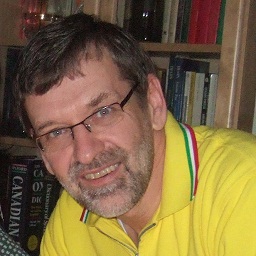Difference between revisions of "User:Chris Szalwinski"
(→Publications) |
(→Applied Research (Potential - Winter 2013)) |
||
| Line 84: | Line 84: | ||
: Pre-requisite: BTP300 | : Pre-requisite: BTP300 | ||
| − | == Applied Research ( | + | == Applied Research (Initiatives - Winter 2013) == |
| − | * Heterogeneous Computing (CPU/GPU) | + | * Heterogeneous Computing (CPU/GPU) for mainstream applications |
=== Personal Research Interests === | === Personal Research Interests === | ||
| − | * numerical methods algorithms for open source libraries | + | * scientific and engineering applications |
| − | + | : numerical methods algorithms for open source libraries | |
| − | + | : direct heterogeneous solution techniques (frontal) | |
| − | + | : non-linear finite elements for granular materials | |
| + | : friction and partial-slip | ||
== Cross-References == | == Cross-References == | ||
Revision as of 09:40, 29 March 2012
| Chris Szalwinski | |
 Faculty Picture | |
| Occupation | Seneca College School of Information and Communications Technology Faculty |
|---|---|
| Office | T2093 |
| Phone | 416.491.5050 ext 33364 |
| IRC | |
| ICT Home Page | https://scs.senecac.on.ca/~chris.szalwinski/ |
| Blog | |
| chris dot szalwinski at senecac dot on dot ca | |
Chris Szalwinski is a Professor at the School of Information and Communications Technology of Seneca College.
Chris teaches C, C++, DirectX Game Programming, and Human Computer Interaction.
Chris is currently developing a course in parallel programming on heterogeneous computers; that is, how to convert your desktop into your very own supercomputer. This course will teach ICT students to harness the processing power available on today's desktops for tasks that benefit from high performance computing. Students who finish this course should find themselves well-positioned to assist employers and clients in incorporating this new, disruptive technology into their day-to-day operations.
Chris is actively pursuing initiatives that will establish a center of applied research in the field of parallel programming at ICT. ICT students with acquired parallel programming skills will have an opportunity to apply and refine their skill set by working as research assistants on real-world projects. Apart from his own particular research interest (modelling of granular materials), Chris is open to collaborating with academia, business, and industry on research projects that will advance the state of this technology and better prepare ICT students for the challenges and opportunities arising from the democratization of the field of high performance computing.
Contents
- 1 Courses
- 1.1 ICT Courses Taught
- 1.1.1 OOP244 - Introduction to Object-Oriented Programming
- 1.1.2 BTP200 - The Object-Oriented Paradigm using C++
- 1.1.3 BTP300 - Object-Oriented Software Development I - C++
- 1.1.4 BTH740 - Human Computer Interaction
- 1.1.5 GAM666, DPS901 - Introduction to 3D Game Programming
- 1.1.6 GAM670, DPS905 - 3D Game Programming Techniques
- 1.2 Forthcoming ICT Courses (Fall 2012)
- 1.1 ICT Courses Taught
- 2 Applied Research (Initiatives - Winter 2013)
- 3 Cross-References
- 4 External links
- 5 Publications
Courses
ICT Courses Taught
OOP244 - Introduction to Object-Oriented Programming
- Further information: OOP244 Web Site
BTP200 - The Object-Oriented Paradigm using C++
- Further information: BTP200 Web Site
BTP300 - Object-Oriented Software Development I - C++
- Further information: BTP300 Web Site BTP300 Wiki
BTH740 - Human Computer Interaction
- Further information: BTH740 Web Site BTH740 Wiki
GAM666, DPS901 - Introduction to 3D Game Programming
- Further information: GAM666 and DPS901 Web Site GAM666 and DPS901 Wiki
GAM670, DPS905 - 3D Game Programming Techniques
- Further information: GAM670 and DPS905 Web Site GAM670 and DPS905 Wiki
Forthcoming ICT Courses (Fall 2012)
- GPU610 Parallel Programming Fundamentals
- Modern GPU (Graphics Processing Unit) technology supports massively parallel computations, which complements the serial processing capabilities of CPU technology. This course teaches students how to parallelize serial code and how to program the GPU. Students learn to read, write, and debug simple heterogeneous programs. Students also study cases that have benefited from parallelization.
- Pre-requisite: OOP344
- DPS915 Introduction to Parallel Programming
- Modern GPU (Graphics Processing Unit) technology supports massively parallel computations, which complements the serial processing capabilities of CPU technology. This course teaches students how to parallelize serial code and how to program the GPU. Students learn to read, write, and debug simple heterogeneous programs. Students also study cases that have benefited from parallelization and develop a heterogeneous application for a client.
- Pre-requisite: BTP300
Applied Research (Initiatives - Winter 2013)
- Heterogeneous Computing (CPU/GPU) for mainstream applications
Personal Research Interests
- scientific and engineering applications
- numerical methods algorithms for open source libraries
- direct heterogeneous solution techniques (frontal)
- non-linear finite elements for granular materials
- friction and partial-slip
Cross-References
External links
Publications
- Anastasiade, J., and Szalwinski, C. (2010). Building Computer-Based Tutors to Help Learners Solve Ill-Structured Problems. In Proceedings of the World Conference on Educational Multimedia, Hypermedia and Telecommunications 2010. Toronto, Ontario, Canada: Association for the Advancement of Computing in Education. pp.3726-3732.
- Szalwinski, C. (2010). Introduction to C++ for C Programmers. Seneca College 889000191647.
- Szalwinski, C. (2011). Intermediate C++. Seneca College 889000191877.